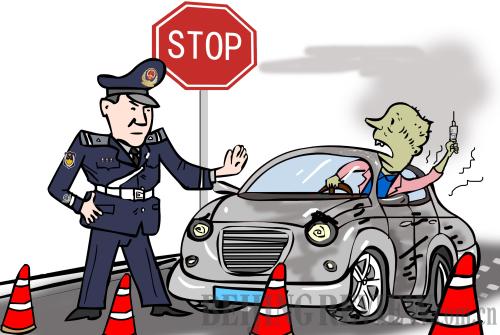|
 |
|
(LI SHIGONG) |
On April 22, a serious traffic accident on a highway in east China's Jiangsu Province caused the deaths of 13 passengers. The driver responsible for the accident had a deadly addictive stimulant drug called "ice" in his system. On May 26, another drug-related crash in Hangzhou, east China's Zhejiang Province, left two dead and one injured.
According to the Chinese Ministry of Public Security, new types of drugs are spreading fast around China. Many drug addicts currently possess driving licenses. Between March and May, 692 bus drivers were found using drugs and were suspended from their jobs. The ministry suggests that drug driving should be covered in the Criminal Law.
With the increasing harm caused by "drug driving," it seems this widely-recognized problem should be made a crime. However, some scholars in the law field think further research into the issue should be started as soon as possible to determine whether drug driving should be covered by the Criminal Law. The following are excerpts of some opinions.
Taking the hard line
Liu Yingtuan (Hainan Daily): According to the current traffic law of China, consuming drugs or alcohol before driving is forbidden, yet there are no explicit guidelines on how to punish drug driving.
If drivers are caught using drugs while operating a vehicle, they will be punished in accordance with the Law on Narcotics Control whether or not they caused any accidents, but penalties are light. Only when drivers have caused very serious consequences can they be punished for a traffic accident, leaving authorities ill-equipped to warn against such dangerous driving behaviors.
Statistics show that China has more than 1.43 million drug addicts, with another 100,000 people getting hooked each year.
According to research done in Britain, drug driving is even more risky than drunk driving, as drivers' reaction time slows by 21 percent from normal condition while under the influence of drugs, whereas in the case of drunk driving, it is 12 percent.
Analysis of drug driving cases shows that drivers under the influence will neglect the safety of other cars and passengers, so that the danger is increasing. The price to pay will be very high if we continue to tolerate drug driving. Driving after taking drugs should be illegal, whether or not the drug use has affected their driving ability.
Mao Kaiyun (www.cnhubei.com): Since May 1, 2011, China has included drunk driving in the Criminal Law. Now one year has passed, and traffic accidents resulting from drunk driving have dropped by 40 percent.
Recently, drug related traffic accidents are gaining in frequency. The seriousness of the issue demands more severe punishment for offenders. The Ministry of Public Security has already started researching possible actions. It's good news that drug driving is likely to be included in the Criminal Law in the near future.
At present, China's laws can only exert light punishment on drug driving and there are no detailed and explicit regulations on how to deal with the crime. It's true that there are still many technical difficulties in administering a standard test for suspected use. However, this should not be an excuse for letting drug drivers avoid consequences. After all, the many technical problems related to drunk driving in the Criminal Law were finally resolved.
In order to minimize traffic accidents and prevent them from happening, drug driving should be covered by law and relevant regulations should be strictly implemented. No tolerance should be given to the dangerous act of drug driving.
Li Zhixian (www.cnhubei.com): Many countries have recently stepped up punishment on drug driving. In France, if a driver responsible for the death of others in traffic accidents is found to have drugs in their system at the time of an accident, he or she will be sentenced to seven years in prison and fined 100,000 euros. In Britain, drivers will be jailed for six months if discovered taking drug before going onto the road. However, in China, the Law on Road Traffic Safety only charges a fine of at most 200 yuan ($33) for drug driving.
In recent days we have seen more and more traffic accidents resulting from drug driving. One gruesome scene after another shows that drug driving must be covered by the Criminal Law. Some members of the Chinese People's Political and Consultative Conference also put forward proposals on this issue in March and were highly supported by other members.
| 